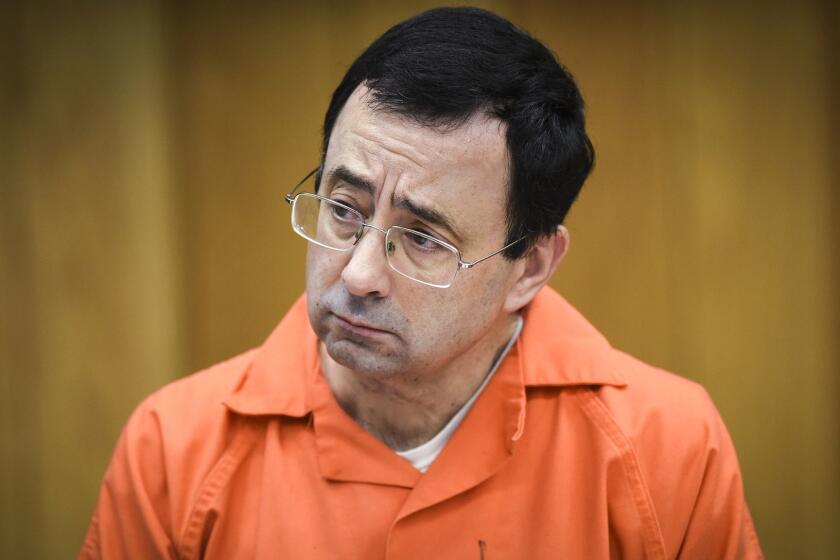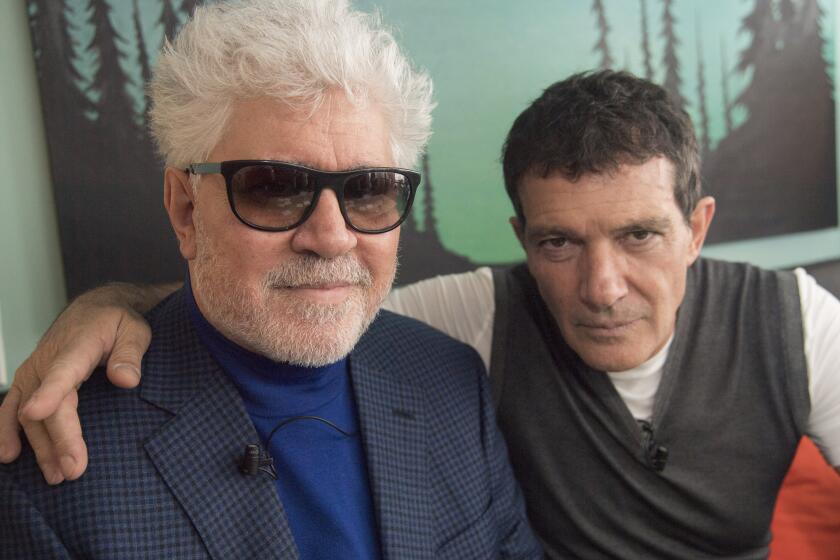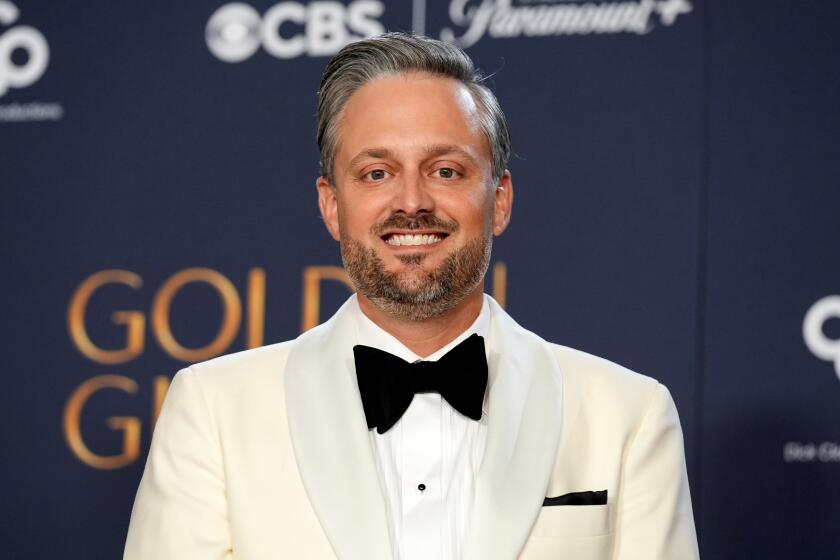Gymnastics abuse scandal documentary strikes ‘At the Heart of Gold’
- Share via
Athletes and their families put their trust in a doctor for USA Gymnastics and Michigan State University, and in those organizations to protect them. That man has been sentenced to 175 years in prison for decades of crimes against young girls.
The Envelope Live screening series continued Dec. 5 at the Montalbán in Hollywood with a presentation of “At the Heart of Gold: Inside the USA Gymnastics Scandal,” an HBO documentary about one of the worst sexual-abuse scandals in the history of American sport. Participating in the onstage discussion with The Times’ Michael Ordoña were producer David Ulich and one of the athletes assaulted by the now-disgraced Larry Nassar: former Michigan State gymnast Larissa Boyce.
We suggest an audience warning to precede the HBO documentary “At the Heart of Gold: Inside the USA Gymnastics Scandal” when it debuts May 3: Will cause heartache, stomach churning and festering anger.
The documentary peels back the layers of manipulation and organizational neglect that allowed Nassar’s abuse to continue over more than two decades and to affect more than 250 young women. Among the lasting images resulting from the convicted molester’s crimes: More than 150 women accusing him in open court.
Boyce said she overcame her fears about speaking up in part because of her own motherhood: “I thought, ‘You know, I have four kids. If I don’t stand up and do the right thing, how will they ever feel like they can do it?’ I wanted to stop the shame that was behind sexual assault. So I mustered up the courage, and my lawyers helped me get my story out there and just start speaking truth.”

“If I don’t do the right thing, how can my kids?” Former gymnast Larissa Boyd of the documentary “At the Heart of Gold” reveals what made her come forward and share her sexual-abuse story publicly.
Ulich said, because of the filmmakers’ work with the U.S. Olympic Committee and the International Olympic Committee: “Early on, some athletes came to us when this news started breaking; we were closely paying attention to it. So we went to people we knew at the U.S. Olympic Committee and said, ‘This is a crisis that’s unfolding. You need to get ahead of this. You can’t just sit back. You need to be proactive and address this situation.’
“And the response we received was, ‘Oh no no, we’re talking to our lawyers and they’re telling us to just be quiet and keep our heads down.’ ”

Producer David Ulich (“At the Heart of Gold”) reveals what his team felt they could bring to a documentary about the USA Gymnastics sexual abuse scandal that we didn’t get from the news.
Ulich said the filmmakers faced considerable resistance in getting people to go on the record.
“We approached people we knew who are decent, respectable people to address this topic, but we realized so many people in this area, in the sports world, they’re beholden to somebody — either financially or because they want to become an Olympic Committee member. There’s so much reluctance to rock the boat. Someone has to make the change and not create this culture.
“At the Karolyi Ranch, the sign, ‘No Parents Allowed’ — I mean, that’s like a red flag. It’s crazy to have a place — the moment you take children away from parental supervision, and one-on-one with the opposite sex, I mean, it’s a recipe for disaster, and that all has to change,” said Ulich about the Texas facility founded by gymnastics coach Béla Károlyi and designated a U.S. Olympic training site.

“At the Heart of Gold” participant and former gymnast Larissa Boyd and producer David Ulich share what they think everyone can do to help prevent sexual abuse.
Despite blowback (Boyce said some people she considered friends stopped talking to her after she went public), Boyce has remained vocal about the scandal, and what can be done to prevent similar situations in the future.
“Seeing films like this,” she said. “Educating yourself. Continuing the conversation. Continue to talk about it. Talk about it with your children. Talk about your children’s body parts. Don’t say their ‘private parts’; talk about their actual body parts. Don’t have any secrets. Just be open and honest when you see something happening. I think one of the big things people don’t want to do is rock the boat if they see something happening. If you see something happening, the right thing to do is to say something.”
“Pain and Glory,” “The Report,” “Downton Abbey” are among the Oscar contenders to visit the Envelope Live screening series.
More to Read
From the Oscars to the Emmys.
Get the Envelope newsletter for exclusive awards season coverage, behind-the-scenes stories from the Envelope podcast and columnist Glenn Whipp’s must-read analysis.
You may occasionally receive promotional content from the Los Angeles Times.










